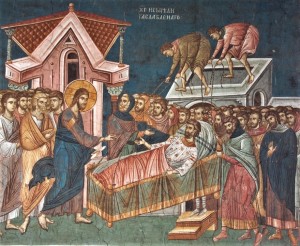Paralysed by sin – Metropolitan of Strumica Nahum
Faith or belief differs and very much depends on which stage of spiritual development a person finds themself. That in which one still believes, and, the goal of the one who is at the level of purification of the heart from passions aspires to (e.g. Jesus Prayer). – is already knowledge and experience (known and experienced by) for the one who is enlightened, and it is not a question of faith. What is still believed and strived for by the one who is at the level of enlightenment of the mind (e.g. Seeing of the uncreated light of the knowledge of God), is already knowledge and experience for the one who is deified, and it is not a question of faith.
But in order for faith to cross into knowledge and experience, a great struggle in gratitude and humility is required. This struggle in gratitude and humility we see in the effort of the paralytic, above all, to come to Christ the God-Man (see: Mark 2, 1-12). The effort to come to Christ with the hope of healing, and instead, to publicly hear only the cause of his illness (sin) and without a second thought nor complaint he accepts it all, does not this show humility and gratitude? Yes, the behaviour of the paralytic man shows that he realized the cause of his illness, and that is sin, as Christ also confirmed, and with humility and gratitude he accepts the Lord’s decision, counting himself unworthy even for “so much” – Christ to forgive him the sins.
Accepting God’s word for us, accepting God’s will for us, as well as accepting God’s providence for us, with humility and gratitude, in the same instance, means our opening and our acceptance of God’s uncreated grace. And we specifically accept them through obedience to the spiritual father. Consequently, this also means our healing; above all, mentally, and if it is for salvation – also bodily. If it is for salvation …
Another thing that highlights today’s gospel reading is sin, and falling away from God as the cause of our illnesses, both mental and physical. The essence of sin is non-humility (conceit) and it manifests itself specifically as disobedience.
And the final point emphasized in today’s Gospel reading is the truth that the Lord Jesus Christ is the only One who has the authority to forgive sins. With each of our sins, we primarily and essentially violate our personal relationship with Him and only He can truly forgive, i.e. He can truly restore this relationship with his uncreated energy (grace).
True repentance means not repeating the sin. That the sin is truly forgiven, is known by the non-repetition of sin. The one who has true repentance can also receive healing from the consequences of sin.
It is precisely this moment, the forgiveness of sin, which is the reason for the thoughts of the scribes. They know from the Book of the Law that only God has the authority and power to forgive sins. Therefore, perhaps, they wouldn’t have thought of anything if Christ just healed the paralytic man, because this would have been just another healing of many which He was doing at that time. But the announcement of the forgiveness of sins offends them. In order to convince them of His authority of forgiveness, Christ heals the paralytic.
For their conversion and salvation, the God-Man Christ acts in the order that the events follow: with love – without reproaching them, as He knows how to do it when He sees no repentance – He reveals to them the thoughts of their hearts, at the same time, He shows them God’s power and authority from (within) Himself by healing the paralytic. This is confirmed by the very gospel itself: “So that all [without exception] were amazed and glorified God, saying,, ‘Never have we seen such a miracle!'”
But take heed unto yourselves, the miracle is for those who see from the side, the sick person is required to be humble in practice (in reality) and grateful. Faith is required of those who see and hear.
By healing the visible physical illness of the paralytic, Christ also healed the invisible illness of the soul (mental illness) of those present – which is much more fearsome than the physical illness. It is one thing to be only physically ill, and it is another to blaspheme the Holy Spirit, that is, to not believe in the God-Man Christ and to be disobedient.
Most-Holy Bogorodica save us
Metropolitan of Strumica Nahum
(31.07.2021 )

